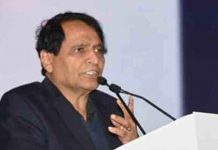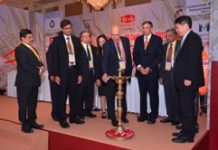- The Indian auto industry, excluding two-wheelers, became the 4th-largest in the world in 2017, registering a double-digit growth in FY 2017-18.
- Passenger vehicle market grew 7.89%, selling 3.28 million units during FY 2018. Sale of passenger cars and vans recorded a growth of 3.33% and 5.78%, respectively.
- Two-wheelers segment dominates the market in terms of volume due to a growing middle class and a young population.
- Sale of domestic automobiles increased at 7.01% CAGR between FY 2013-18, with 24.97 million vehicles sold in FY 18.
New Delhi, May 03, 2019: Indian cities are now home to millions of vehicles, whether domestic or commercial, two-wheelers, three-wheelers, buses or even locally modified electric vehicles that are used to ferry goods and passengers at a cheap cost within the city. Together, these contribute to traffic and parking congestion as well as air pollution, thereby raising health and safety issues. There is an urgent need to address the challenges related to the country’s road transport sector, including inadequate public transportation, road safety, poor traffic management, poor parking infrastructure, etc. These hamper the smooth movement of passengers, goods, raw materials and agricultural produce across the country.
The Transport India 2019 expo will showcase end-to-end solutions for ‘Smart Transport’ in the country. The expo will cover the following sectors:
- Electric/Hybrid/Alternate Fuels Vehicles
- Connected/Autonomous Vehicles
- Storage/Batteries
- Public Transportation
- Rail/Metro Rail/Hyperloop
- Bus/Bus Rapid Transit System
- Smart Cards/Smart Parking
- Traffic Control Rooms
- Intelligent Transport Systems/Road Traffic Systems (safety, security, surveillance), etc.
Speakers from a number of prominent organisations/companies will speak at the conference sessions on subjects such as: Developing Smart Cities for our Citizens; Energy Storage for EVs; EV Charging Infrastructure, EV Charging-as-a-Service, Parking Management, Public Transportation, Road Safety: For Entrepreneurs, Businesses and Cities, etc. will touch on issues relevant to the transport industry. Meanwhile, special events like the City Leaders Conclave; Mobi Colloquium; Smart Cities India Awards; and, EV & Battery Tech Summit, will involve participants in enthralling discussions and activities relevant to future smart cities.
Nominations for awards under the Urban Mobility category have been received from: Ashok Leyland; Axis Bank for Kochi Metro; Karnataka State Road Transport Corporation; Odisha State Road Transport Corporation; Sagar Smart City Ltd.; Schindler India Pvt. Ltd.; and, Smart City Ahmedabad Development Ltd.
Some prominent names that will contribute towards making this show a success include: AAM India, Automotive Research Association of India (ARAI), Anest Iwata Motherson Pvt. Ltd., Avan Motors, CommScope, Trinity Touch Pvt. Ltd., Delta, Dassault Systemes, Electric Vehicle India, Euclion Energy, Exicom, Efftronics, Fortum India, Frugal Innovations, Greaves Cotton, Hitachi India, Logipix, Magenta EV Solutions Pvt. Ltd., Masstrans, Microtex, Neptune Automatic, Olectra Greentech Ltd., OKAYA, Ramboll Group, RPG Smart Infra, Schindler, STMicroelectronics, Subex, Saft Batteries, Toyota Kirloskar Motors Pvt. Ltd., Tom Tom, Tata Communications, Thaihuawei Battery Co. Ltd., TVS logistics, Virgin Hyperloop One, VTRAC Worldwide, ValetEZ Smart Parking, etc.
Talking about the event, Shri Prem Behl, Chairman, Exhibitions India Group, said, “Adequate and good quality transport is key to the development of any economy. It not only ensures smooth movement of goods but also creates opportunities for mobility of the population, be it within the city or to other places in the country. Another critical aspect is the cost incurred by the government to make available different forms of fossil fuels to keep the transport system running. This is where the Transport India 2019 expo comes in. The event allows all players of the segment, whether the government, manufacturers or consumers, to explore the latest technological advancements made in the field, as well as the alternative fuels available, that would allow great savings in energy bills, create a clean environment, and improve the existing infrastructure to align it to the modern times.”
Newsvoir






























